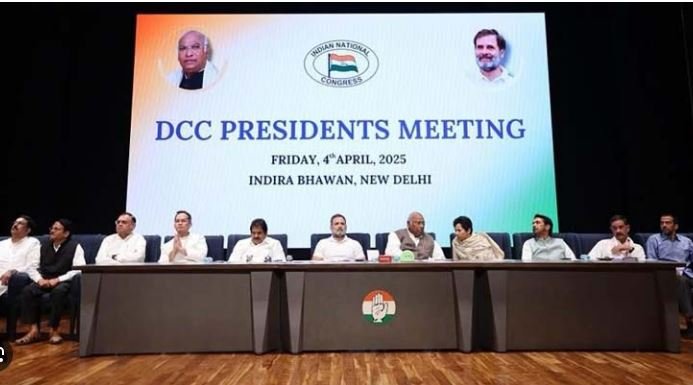Jammu, 4th April: In a significant step aimed at reinforcing the grassroots structure of the party, All India Congress Committee (AICC) president Mallikarjun Kharge today underlined the importance of strengthening district-level units across the country. Addressing a high-level joint meeting of District Congress Committee (DCC) presidents from several states including Uttar Pradesh, Bihar, Jharkhand, Uttarakhand, West Bengal, and the Union Territories of Jammu & Kashmir and Ladakh, Kharge emphasized that district units are vital pillars of the Congress party’s organizational framework and must be empowered with greater responsibilities.
Held at the AICC headquarters in New Delhi, the meeting saw the participation of senior Congress leaders, including Leader of the Opposition in the Lok Sabha, Rahul Gandhi, who echoed Kharge’s sentiments by describing district presidents as the “backbone” of the party. He stressed the need to empower these leaders further, allowing them a more decisive role in electoral strategies and candidate selection processes.
Kharge announced that the party has resolved to not only strengthen the district units but also enhance the authority of DCC heads so that they can effectively coordinate and energize Congress activities at the block, mandal, ward, panchayat halqa, and booth levels. He stated that DCC presidents, due to their proximity to the grassroots, have a deeper understanding of both the party cadre and the electorate, making their input invaluable, especially during the selection of candidates for Assembly and local body elections.
Particularly addressing the representatives from Jammu and Kashmir, Kharge urged them to step up preparations and intensify grassroots outreach in view of the forthcoming Panchayat and Local Bodies elections in the region. He underlined that the involvement of DCC heads in candidate finalization must go beyond formality and become a critical component of the party’s democratic decision-making structure.
Rahul Gandhi, in his address, reinforced the centrality of DCC heads to the Congress party’s revival strategy. He remarked that while traditionally the State-level committees have played the dominant role in organizational and electoral decisions, going forward, the party would increasingly rely on district-level feedback and leadership for better political outcomes. He called upon all DCC leaders to work with renewed commitment to strengthen the party’s base and to foster a more inclusive and connected Congress at the grassroots level.
From Jammu and Kashmir, 13 out of 21 district presidents participated in the meeting. The delegation from J&K was led by Pradesh Congress Committee (PCC) president Tariq Hameed Karra. Senior leaders such as Ghulam Ahmad Mir, the Congress Legislative Party (CLP) leader in the J&K legislature and AICC general secretary in-charge of West Bengal, also marked their presence, reflecting the meeting’s strategic importance. Dr Naseer Hussain, AICC general secretary and in-charge of J&K affairs, was also in attendance and took stock of the party’s organizational status in the region.
DCC Rajouri president Shabir Khan and a DCC president from Kashmir took the opportunity to speak during the session, offering ground-level feedback and sharing insights from their respective districts. Their contributions provided a nuanced picture of the political dynamics and challenges on the ground, allowing the central leadership to better tailor the party’s strategic direction in the region.
Also present at the meeting was K C Venugopal, AICC general secretary (Organisation), along with several other top-ranking leaders, underscoring the Congress party’s growing focus on internal organizational reform and capacity building. The discussions centered around enhancing coordination between the central leadership and district units, strengthening outreach programs, and preparing for upcoming elections with renewed vigor and grassroots connect.
The meeting concluded with a consensus on empowering DCCs not just as implementers of central directives but as vital think tanks and operational hubs of the Congress party. This move is being widely seen as part of a broader transformation within the party to decentralize power and foster a more dynamic and responsive organizational culture. By placing district leaders at the core of its electoral and policy-making processes, the Congress hopes to reinvigorate its presence in key states and regions ahead of the upcoming polls.
The emphasis on grassroots mobilization and local leadership signals a renewed determination within the Congress to regain lost political ground by reconnecting with the masses.




